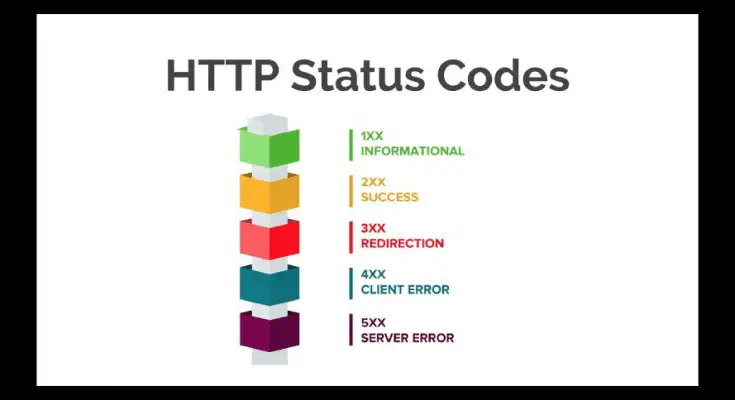Have you ever tried to access a web page or even your website as a user, only to see a status code? The status codes actually shed light on the reason your request was not completed. Most users will not try to explore the reason but quit the page and move on to your competitor’s site.
Such a practice lowers the ranking of your website. So, you cannot take the risk of allowing your users to explore the website of your competitors while leaving yours. The problems usually occur due to poor site maintenance. You need to explore status codes and fix them to provide a quality user experience.
Dig deeper into this article to explore a beginner’s guide to HTTP status code cheat sheet.
Top 5 HTTP Status Codes Every Website Owner Should Know About
When a user explores a website or page, they either land on the requested file or faces an HTTP page. The HTTP page depicts some code and makes the user aware that their request was not processed or is in the process. In either case, it frustrates the users as they have to wait. So, they opt for the easier path by closing the page and moving on to the next. The practice is disadvantageous for website owners.
Here are the top HTTP status codes every website owner should know about to fix them better.
1) 1xx Status Codes: Informational Requests
The first type of status code every website owner should know about is 1xx status codes: informational requests. It denotes that the request of the user was proper, and the server has understood it too; however, it needs a little time to process it. This type of status code usually emerges due to poor page loading speed. The website owners need to optimize page load speed, as it can prompt the users to leave the site.
Typically, a website can face any of the following 1xx status codes: informational requests errors:
- 100 Continue
- 101 Switching Protocols
- 102 Processing
- 103 Early Hints
2) 2xx Status Codes: Successful Requests
2xx status codes: successful requests can be termed as one of the most harmless status codes, as it shows the users that their request was successful and they will get the results of their request. This type of status code is quite frequent when the users explore the web, as most of the requests are fulfilled immediately due to proper website maintenance.
Some of the most common 2xx status codes: successful requests include the following:
- 200 OK
- 201 Created
- 202 Accepted
- 203 Non-Authoritative Information
- 204 No Content
- 205 Reset Content
- 206 Partial Content
- 207 Multi-Status
- 208 Already Reported
- 226 IM Used
3) 3xx Status Codes: Redirects
3xx status codes: redirects appear on any website when the users search for a page on some website, but they are directed to another page instead of the required one. This status code negatively impacts the SEO of the website and increases its bounce rate. When the user searches for a page, they intend to land on it without any interruption, but the redirects interrupt their experience, prompting them to leave the page/site.
Commonly faced 3xx status codes: redirects include the following:
- 300 Multiple Choices
- 301 Moved Permanently
- 302 Found
- 303 See Other
- 304 Not Modified
- 305 Use Proxy
- 306 Unused
- 307 Temporary Redirect
- 308 Permanent Redirect
4) 4xx Status Codes: Client Errors
One of the most common status code errors every website owner and the user should know about is 4xx status codes: client errors. This type of status code highlights that there was something wrong with the request, due to which is it is not processed, and the required page cannot be displayed. The issue, in this case, is on the client or user end and not on the end of the website.
Your website can show any of the below mentioned 4xx status codes: client errors;
- 400 Bad Request
- 401 Unauthorized
- 402 Payment Required
- 403 Forbidden
- 404 Not Found
- 405 Method not Allowed
- 406 Not Acceptable
- 407 Proxy Authentication Required
- 408 Request Timeout
- 409 Conflict
- 410 Gone
- 411 Length Required
- 412 Precondition Failed
- 413 Request Entity Too Large
- 414 Request-URL Too Long
- 415 Unsupported Media Type
- 416 Request Range Not Satisfiable
- 417 Expectation Failed
- 418 I’m a teapot
- 421 Misdirected Request
- 422 Unprocessable Entity
- 423 Locked
- 424 Failed Dependency
- 425 Too Early
- 426 Upgrade Required
- 428 Precondition Required
- 429 Too Many Requests
- 431 Request Header Fields Too Large
- 444 Connection Closed Without Response
- 451 Unavailable for Legal Reasons
- 499 Client Closed Request
5) 5xx Status Codes: Server Errors
The last HTTP status code you should know about is the 5xx status code. This particular code denotes the server error. This type of status code denotes that the user has entered a genuine request, but there is some issue with the server, due to which it cannot be processed. Some of the most common 5xx status codes: server errors include the following:
- 500 Internal Server Error
- 501 Not Implemented
- 502 Bad Gateway
- 503 Service Unavailable
- 504 Gateway Timeout
- 505 HTTP Version Not Supported
- 506 Variant Also Negotiates
- 507 Insufficient Storage
- 508 Loop Detected
- 510 Not Extended
- 511 Network Authentication Required
- 599 Network Connect Timeout Error
5xx status codes: server errors can negatively impact the SEO of any website. So regular site maintenance is crucial to fix such issues. You can hire website maintenance services to ensure proper and regular maintenance of your site against all status codes to provide a quality user experience.
Maintain your website to avoid unnecessary status codes!
Now that you know all the common and uncommon status codes and how they affect user experience and website, you need to fix the issue. Ensure regular website maintenance and ensure a hassle-free experience for your users. Contact the professionals if you lack the technical knowledge and skills to fix the issues.



